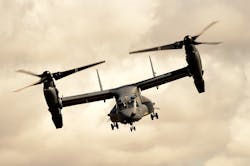L3Harris to build and upgrade airborne electronic warfare (EW) to defend aircraft from missile attacks
ROBINS AIR FORCE BASE, Ga. – Airborne electronic warfare (EW) experts at L3Harris Technologies will build, upgrade, and maintain hardware and software for the AN/ALQ-211 airborne Advanced Integrated Defensive Electronic Warfare Suite (AIDEWS) under terms of a potential $584 million five-year contract announced Monday.
Officials of the U.S. Air Force Life Cycle Management Center at Robins Air Force Base, Ga., are asking the L3Harris Space & Airborne Systems segment in Clifton, N.J., for production, engineering, and repair for the ALQ-211 AIDEWS versions 4, 8, and 9.
The ALQ-211, a family of electronic self-protection avionics, includes the AIDEWS, which protects U.S. Special Forces helicopter and tiltrotor aircraft from sophisticated enemy radio frequency (RF) threats. Tiltrotor aircraft take off and land like helicopters, and fly like fixed-wing turboprop aircraft.
This contract calls for L3Harris to provide AIDEWS block cycle software development, engineering support, technical orders, system integrity, and travel.
The ALQ-211 detects, denies, disrupts, degrades, and evades lethal threats and provides situational awareness for enemy threats that involve RF, infrared, and laser weapons sensors.
When the aircrew encounters an RF signal that represents an enemy threat, the ALQ-211 first determines how far away it is from the aircraft. If the aircraft is in lethal range of a radar-, infrared-, or laser-guided missile, the ALQ-211 can break missile lock through RF and electro-optical countermeasures by cueing chaff and flares.
As the aircraft’s survivability suite controller, the ALQ-211 coordinates the response for laser and infrared threats. The system is integrated into the CV-22 Osprey Special Operations aircraft. It also is fitted to the Norwegian NH 90 multi-mission helicopter, as well as F-16 fighters for Chile, Poland, Pakistan, Turkey, and Oman.
The ALQ-211 works in densely populated hostile environments with mobile air defenses in all weather conditions, during the day, and at night. It is effective against threats hiding in terrain, and that employ adaptive tactics, L3Harris officials say.
On this contract L3Harris will do the work in Clifton, N.J., and should be finished by April 2028. For more information contact L3Harris Space & Airborne Systems online at www.l3harris.com.
